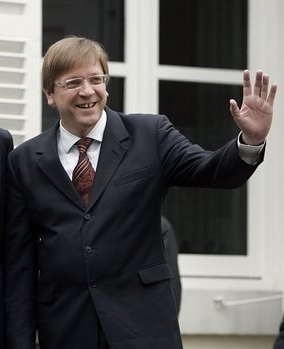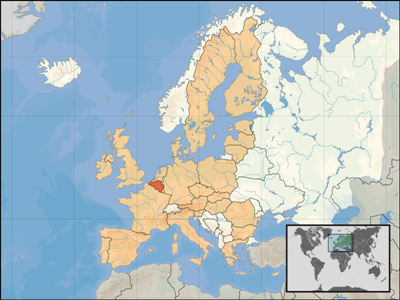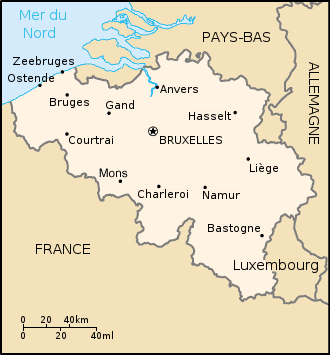Guy Verhofstadt (born April 11, 1953) is a Belgian politician, municipal councillor in Ghent and current Prime Minister of Belgium.
Early career
Born in 1953 in Dendermonde, he became president of the Flemish Liberal Student's Union (1972-1974) while studying law in Ghent. He quickly became the secretary of Willy De Clercq, who was at that time the president of the Flemish liberal party (PVV). In 1982, at age 29, he became president of the party. In 1985 he was elected into the Chamber of Deputies, and became Deputy Prime Minister and Minister of Budget under Prime Minister Wilfried Martens. Because of his economic views and his young age, he became known as "Baby Thatcher". Another nickname from that era is "da joenk", a Brabantian dialect expression meaning "that kid" (in a pejorative sense, referring to his rather iconoclastic and immature style).
After being ousted from government he became leader of the opposition. After a failed attempt to form a government in November 1991, he changed the PVV into the Vlaamse Liberalen en Democraten (VLD). This new party attracted many politicians from other parties, notably from the Volksunie (VU) and the Christelijke Volkspartij (CVP).
However, despite the fact that many had high expectations, the party did not manage to outstrip the CVP. Verhofstadt resigned and disappeared from the political scene, only to return to the party's presidency in 1997 with a less radical image. He gradually moved away from neo-liberalism, and became more of a centrist figure, a change which especially became clear during his first term as Prime Minister.
Verhofstadt I
Partly because of a food scandal that broke out just before the 1999 elections, the VLD became the largest party in the country, obtaining over 22% in Flanders. He quickly formed a coalition with the socialist and the green party in Flanders, and with the French speaking counterparts of these parties (a symmetric coalition) in Brussels and Wallonia. He was appointed Prime Minister on July 12, 1999. It was the first Belgian government without the Christian-democrats since 1958, and the first one with the green parties.
The economic situation gave him leeway in raising the lowest social alimonies and lowering taxation. After 2001, the economic situation worsened. The 'Ageing Fund' or 'Silver Fund' was set up, in order to ensure the maintenance of the retirement pays until 2030. But despite his efforts to boost the economy while attempting to maintain the social benefits system, unemployment rose, after dropping during the second Dehaene cabinet.
Much to the disapproval of his coalition partners, Verhofstadt and his VLD opposed granting the right to vote to non-EU-residents. Instead, they proposed and were able to liberalize procedure for obtaining Belgian citizenship.
During the prelude to the Iraq crisis of 2003, Belgium joined France, Germany and Russia in their opposition against the invasion.
Verhofstadt II
Following the 2003 general elections, Verhofstadt formed his second cabinet without the green parties, who were virtually annihilated in the election. For various reasons, the formation of the second government was delayed well beyond normal: the economic situation worsened to 1999 levels, both politically similar parties (liberals and socialists) gained approximately the same seats. Additionally, the various world governments were pressing for the abolition of the law of universal competence (also known as the "genocide law"), which gave Belgian judges the authority to accuse and sentence non-Belgians with crimes against humanity. Accusations that were made had rarely been followed up, and were often dismissed as being little more than politically motivated international insults. Verhofstadt's second government was sworn in on July 12, 2003, with both coalition partners having agreed to abolish the so-called "genocide law" and replace it with a much weaker one.
In the Flemish regional elections of June 13, 2004, his party lost votes, slipping into third place in Flanders. Though this has had no direct impact upon his position as Prime Minister, there were rumours that the Christian-Democratic party (CD&V) that won the elections, would participate in federal government. Verhofstadt was suggested as a candidate to replace Romano Prodi as the next President of the European Commission, but his candidacy was opposed and rejected by a coalition led by Tony Blair and Silvio Berlusconi.
Since then, Verhofstadt has been faced with internal crisis after crisis. The first crisis coming to a head in the autumn of 2004 was the question whether DHL would invest in Brussels Airport, located in the Flemish municipality of Zaventem. The question which nearly caused the collapse of the cabinet was whether to grant DHL extra landing rights during the night, this being a hot topic of public debate and various court cases. In the end the split between employment and night rest was for nought as DHL had only used the Zaventem option in order to get better conditions from Leipzig.
After the DHL crisis, Verhofstadt was faced with a communautary crisis with regard to dividing the administrative arrondissement Brussels-Halle-Vilvoorde. The dividing was an issue that the parties forming the Flemish regional government had written in their government agreement. This caused a veto to be posed by the Walloon parties. The crisis dragged on until spring 2005 when the matter was shelved until after the federal elections of 2007 as the Flemish parties forming the government, given the for them disastrous opinion polls, didn't have the nerve to collapse the government.
In the autumn of 2005, Verhofstadt managed to score a success when he was able to negotiate a "Generation Pact" with regard to employment and social reforms, regardless of the opposition and actions of the unions.
Verhofstadt was sworn in as municipal councillor in Ghent in January 2007, as a result of the 2006 municipal elections. In the council, he is seated next to another cabinet minister, Freya Van den Bossche, who was elected a municipal councillor as well.





